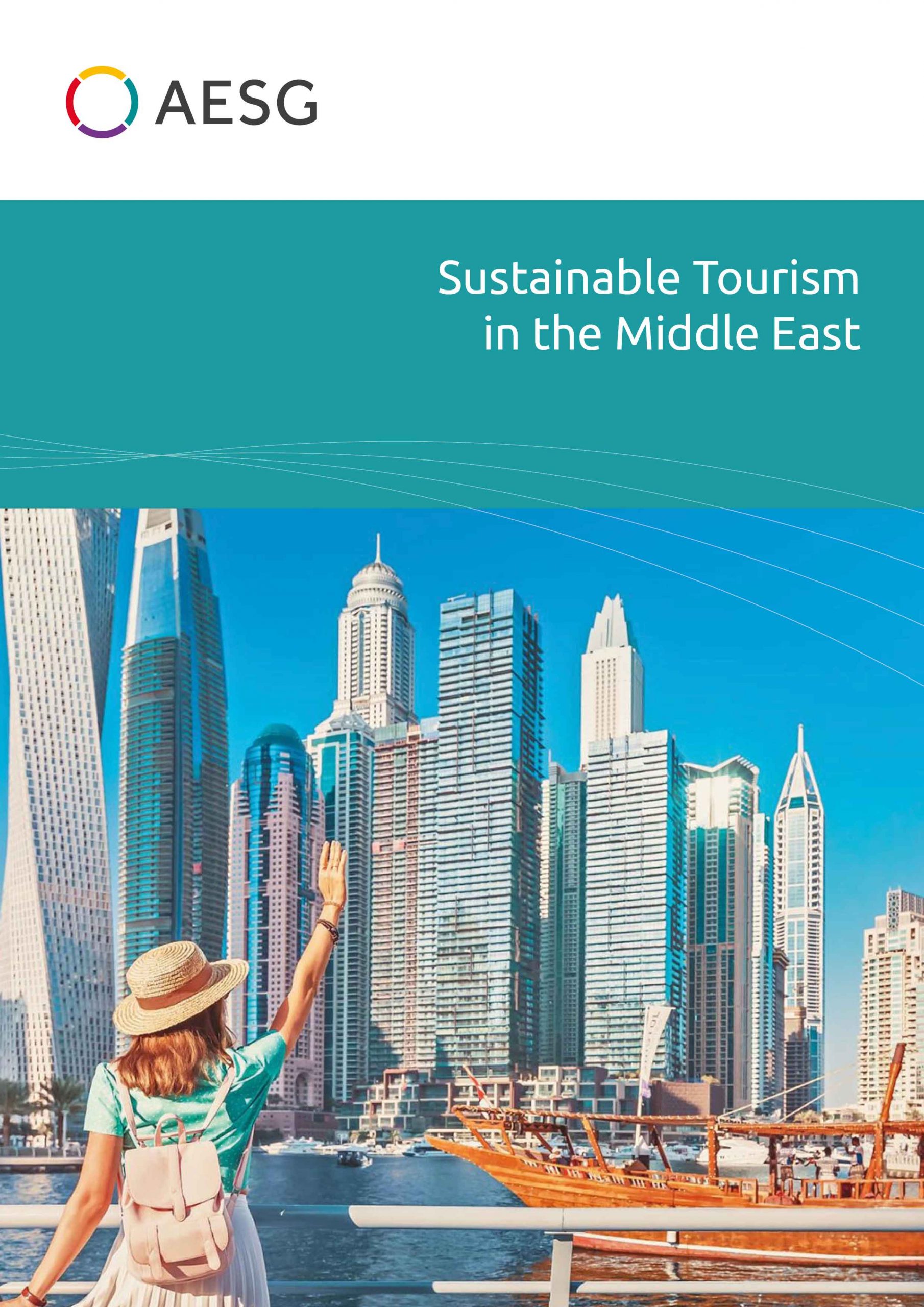
Sustainable tourism in the Middle East: Where do you start?
Sustainable tourism offers an estimated market opportunity of US$246 billion in 2022 in the Middle East1. The whole value chain and local communities involved can benefit from the opportunity. The tourism industry wants to embark on a transformation via capability building, partnership creation and integration of tools and processes that reinforce sustainability such as sustainable procurement.
Sustainable tourism is already happening. For instance, Gili Islands in Indonesia, an archipelago of 3 small islands welcomes millions of tourists every year. Travel within the island is facilitated by horse carts, bicycles or on foot as all motorised vehicles are banned on soil. Coral reef restoration, animal welfare, waste recycle, and local employment are promoted heavily after an imminent threat to life of the islands. These measures allow tourists to enjoy the natural offerings of the island without the veil of pollution, adding to the immense popularity of these islands. This is the quintessential integration of sustainability across the value chain of tourism to achieve a reduced impact of human activity on the planet. Sustainability could bring a unique opportunity to preserve what tourism otherwise erodes.
What does the future hold for tourism? What is needed for sustainable tourism to be realised? This article outlines the sustainable tourism concept, its importance for the Middle East and setting practical and achievable objectives for the industry in the coming years.
What is sustainable tourism?
Tourism is a development-oriented, employment generating, self-sustaining industry with significant positive impacts on the economy of a country. However, it also may create negative impacts on the environment, cultural heritage, habitat, and its inhabitants when not properly managed. A study published in 2018 by “Nature Climate Change” suggested that tourism is responsible for roughly 8% of the world’s carbon emissions while it accounts for 10% of the world’s GDP. Sustainable tourism is the answer to the tourism paradox to maximise its value creation and minimise negative impacts on the natural and social environment.
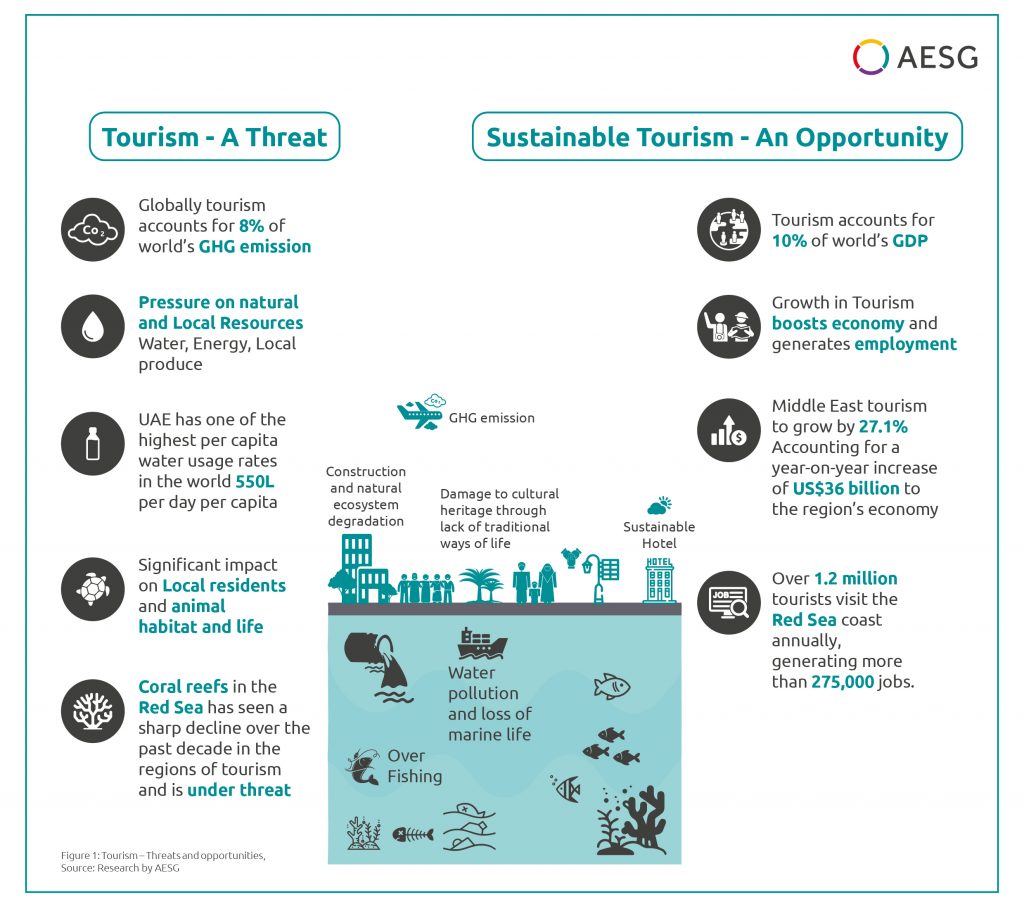
Figure 1: Tourism – Threats and opportunities, Source: Research by AESG
To harness these opportunities of sustainable tourism, it is required that major players (like hotels, food and beverage outlets, entertainment parks, etc.) in the tourism sector receive adequate capability building towards building a sustainable tourism destination. International institutions like the United Nations World Tourism Organization (UNWTO) are providing training to hotels in an effort to upskill the staff on sustainable practices. For example UNWTO is working in Egypt to train more than 30 hotels in adopting sustainability practices to reduce carbon footprint and to engage with local communities to improve gender equality and employment.
The opportunity lies in partnerships across the value chain. Many independent agencies to audit and certify the sustainability efforts undertaken by these entities. Number of certifications have emerged in the industry to guide private sector players on their journey to sustainability compliance, such as Green Key, UNWTO, GSTC etc. (Details in Figure.2) Their objective is to detail specific actions that need to be implemented in a comprehensive list of areas such as energy, water, waste, carbon, and some economic and social initiatives.
Below are some examples of international certifications and standards for sustainability in the tourism sector that are already available.
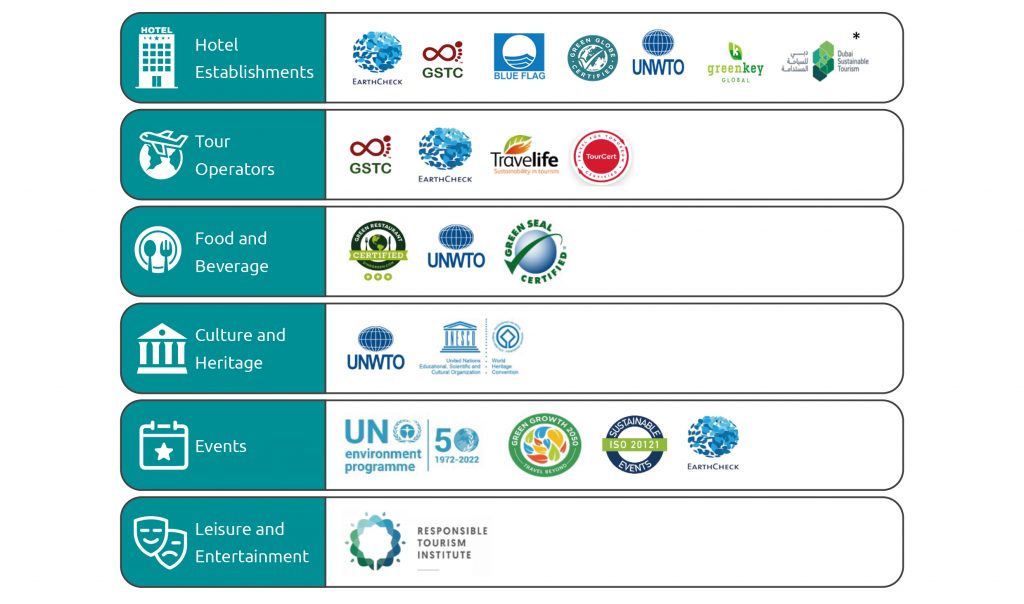
*Dubai Sustainable Tourism guidelines are applicable to hotels in Dubai only
Figure 2: International certifications and standards for sustainability in the tourism sector,
Source: Research by AESG
Opportunities for sustainable tourism in the Middle East
According to the UNWTO global international tourist arrivals more than doubled (+130%) in January 2022 compared to 2021. The Middle East saw a growth of 89% in January 2022 over 2021. Tourism in the Middle East is experiencing unprecedented growth, with countries such as Oman seeing more than 10% of their total GDPs coming from tourism. Geographically, it offers everything from a vast desert landscape to scenic beaches and mountains. The region is especially important from the perspective of cultural tourism, because of its unique historical monuments and archaeological sites (such as Petra, Jordan).
As the world recovers from the COVID crisis and lock-down rules get eased throughout the world, we see an increase in demand across all tourism related industries. Host communities, national governments and tourism companies have begun discussions on how to better respect the limits of ecosystems with the resumption of the travel. The Middle East is leading the world in this endeavour. The EXPO 2020, held in Dubai, was an event that brought sustainability to the forefront of modern business practices. The exhibition received more than 15 million visitors and launched the mission of sustainable tourism at a global scale.
According to Booking.com’s Sustainable Travel Report 20222 and Sustainable Travel Study 20223 by Expedia Group, we observed increased levels of sustainable choices from travellers globally. Such sentiments are also applicable to travellers to the Middle East.
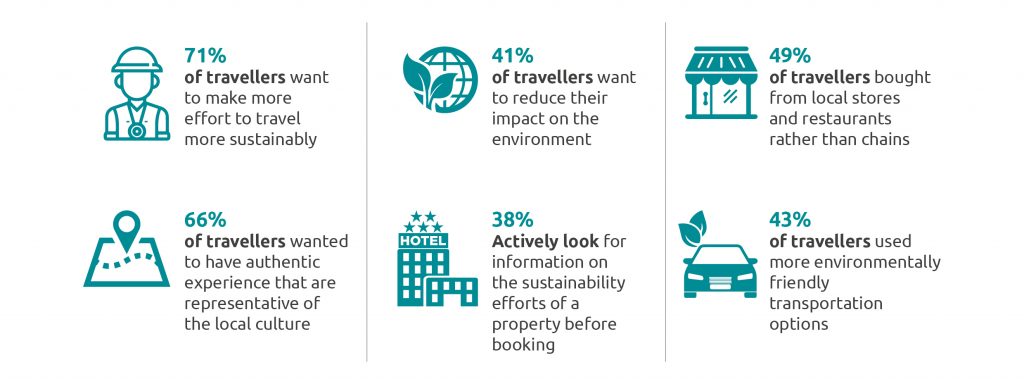
Figure 3: Sustainable travel data, Source: Booking.com – Sustainable Travel Report 2022 & Expedia Group – Sustainable Travel Study 2022
According to a study done by booking.com, 61% of surveyed travellers said that the pandemic has made them want to travel more sustainably. Sustainable tourism can provide a great experience that visitors will want to repeat. For this to happen, tourists need opportunities to learn from locals through cultural exchanges and interactions with host communities during their stay. Environmental purity and cultural richness are two of the primary goals of sustainable tourism in the Middle East which can be achieved through responsible travel.
How to implement sustainable tourism in the Middle East?
We recommend using tools and frameworks to develop your sustainability strategy to achieve sustainable tourism in the Middle East. Figure 4 illustrates a sustainability tourism framework using a cross-sectoral approach which encompasses improving energy and environment management, socio-economic upliftment of community, preserving tangible and intangible cultural heritage and developing a risk and resilience plan to mitigate unforeseen challenges.
[2] https://globalnews.booking.com/download/1161485/booking.comsustainabletravelreport2022final.pdf
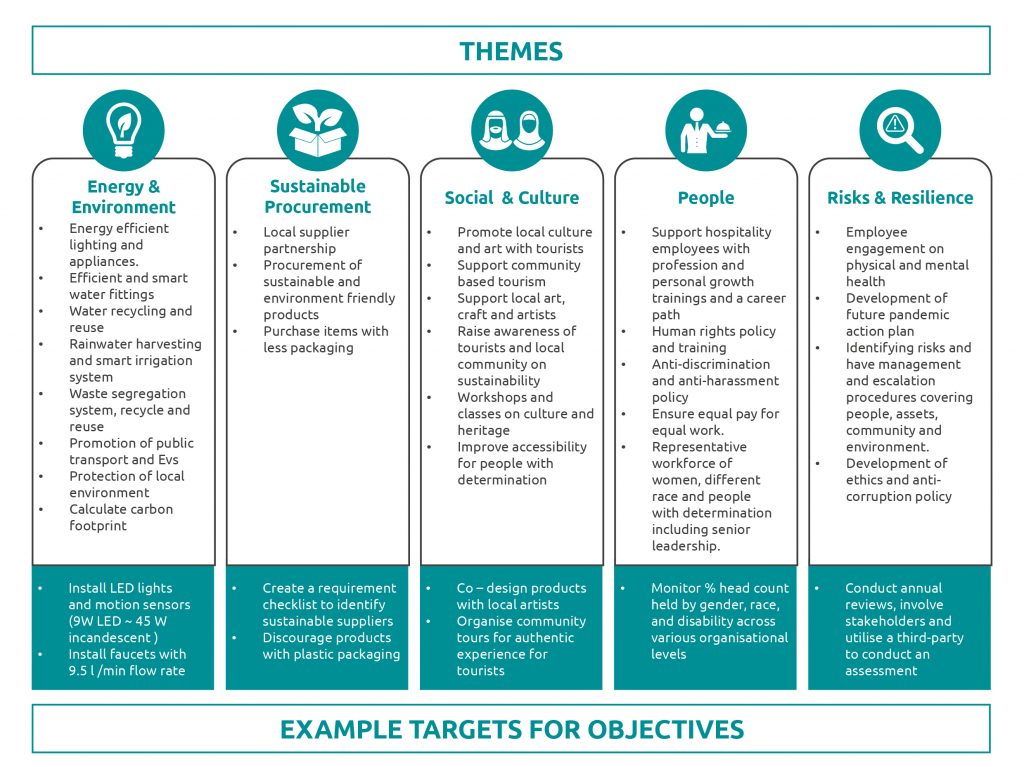
Figure 4: Sustainable tourism framework using cross-sectoral approach, Source: Research by AESG
The World Travel and Tourism Council (WTTC) provides a framework called WTTC Hotel Sustainability Basics which is a coordinated set of sustainability indicators that all hotels should implement as a minimum. Developed by the industry for the industry, they represent the 12 actions that are fundamental to hotel sustainability. WTTC is calling on hotel operators, owners, associations, and investors around the world to officially support the initiative and work across their networks to implement the criteria over the next three years.
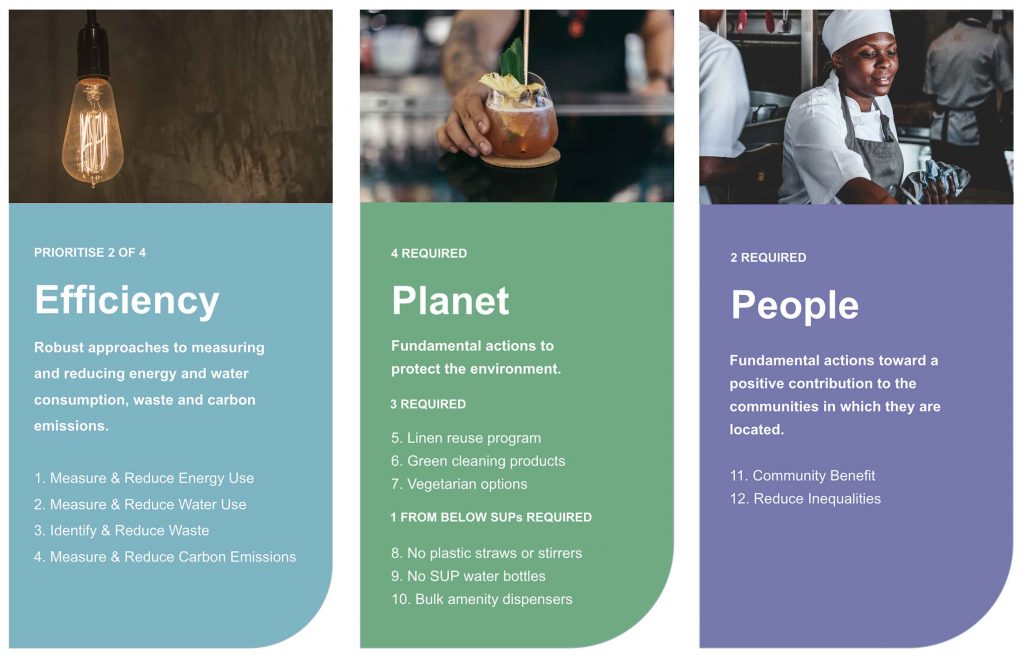
Figure 5: WTTC Sustainability Basics Overview. Source: WTTC
Transforming Tourism through Sustainable Procurement:
Sustainable tourism has the potential to strengthen sustainable consumption and production. Sustainable procurement can play a leading role in helping to better manage resources and improve resource efficiency throughout the tourism value chain. By incorporating sustainability requirements into their purchasing processes, corporate buyers can convey a strong signal to, and drive markets towards, more sustainability and help scale up the market for more sustainable products, services and works.
Circular procurement is a flexible and dynamic strategy that focuses on reuse, repair and redesign of products. Circular procurement contributes to the enabling conditions of a system that creates value and social well-being while maintaining resources at their highest possible value in the whole life cycle.
Example of sustainability framework: Procurement
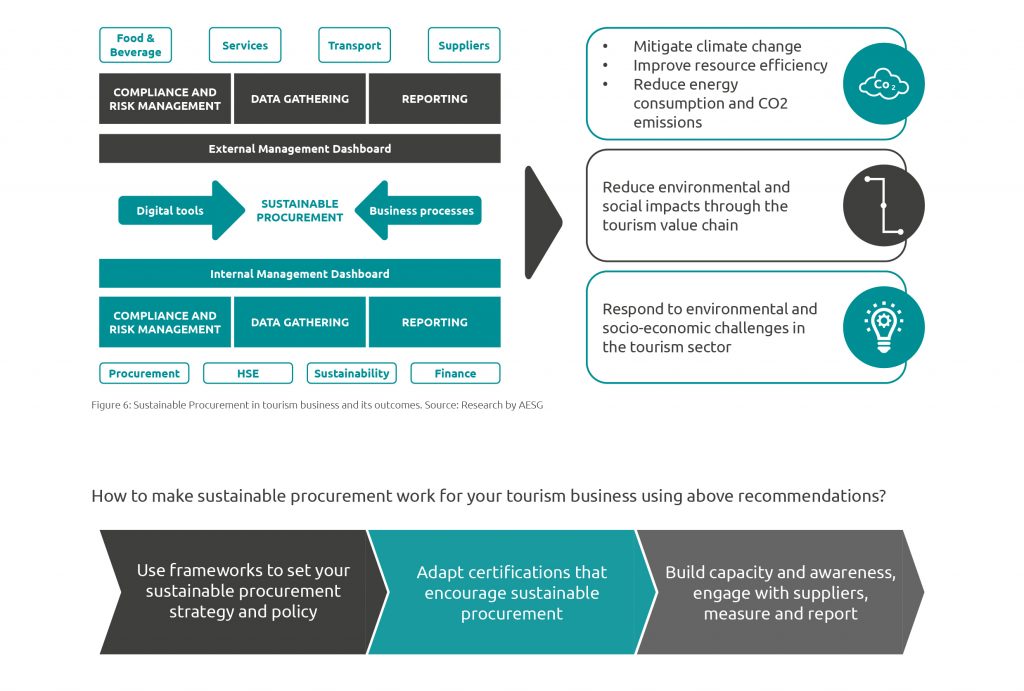
Current Landscape and opportunity of COP conferences
Many public and private entities in the Middle East are recognizing the challenges being posed by increased tourism in the region and are taking steps to keep tourism sustainable.
Jordan is actively punching above its weight when it comes to social tourism. The kingdom is playing an important role in the fight against climate change and continues to be a pioneer in smart renewable energy initiatives. Marrakech is another popular tourist destination in the Middle East that aims for green tourism. The city hosts many sustainable events and is known for its efforts in making the city more sustainable and reducing its carbon footprint. It received ISO 14 011 certification for its sustainable tourism efforts.
Governments, private sector and international agencies are working towards making this goal a reality by providing a conducive legal and regulatory framework, access to land, financing instruments and attractive investment climate as well as convenient transportation facilities. Egypt and UAE are bringing sustainability to the forefront as hosts of COP 27 and 28 conference this and next year. The private sector is seizing this opportunity to showcase its initiatives and drive.
UAE’s commitment to sustainability is reflected in its efforts to support ecotourism and environmental protection. A UAE based start-up, ENVI lodges focuses on operating retreats that have a low impact on the environment and that are immersed in nature. The lodges offer luxury of five-star amenities in unchartered territories with sustainability at its core. And UAE looks forward to hosting next year’s climate summit Cop28, which will address opportunities to create a more sustainable and progressive economic future through tourism.
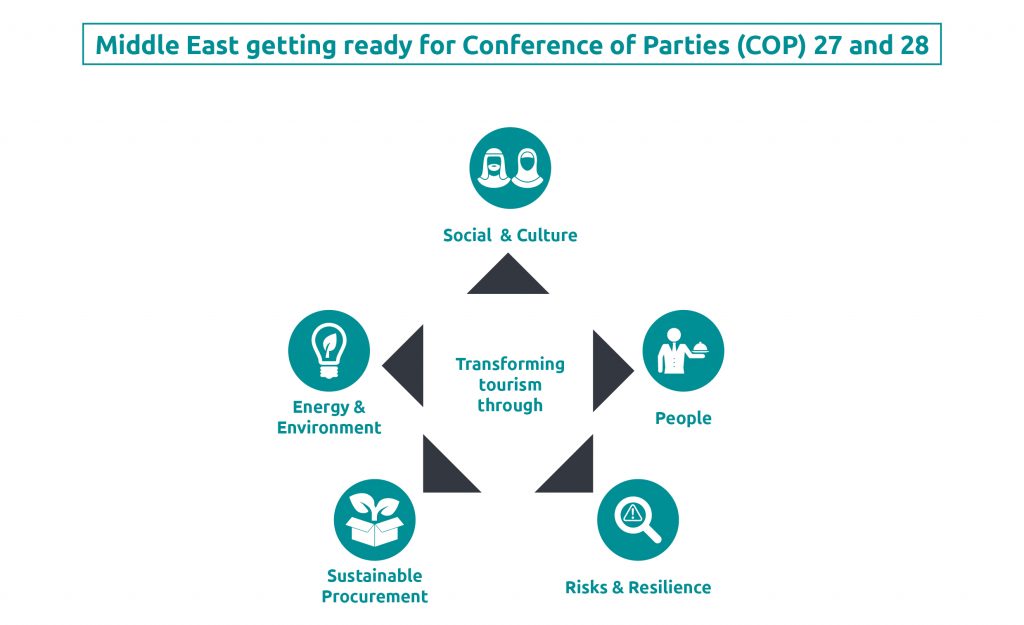
Figure 7: Preparing for COP 27 & 28: Building blocks from tourism sector. Source: Research by AESG
Let’s use this opportunity and drive practical outcomes that align the region to the vision of sustainable tourism! The following are the actions we recommend as your organisation is preparing for COP conferences in Egypt and UAE:
How can AESG help?
AESG is a specialist consultancy, engineering and advisory firm headquartered in London, Dubai, Riyadh, and Singapore working on projects throughout Europe, Asia and Middle East. We pride ourselves as industry leaders in each of the services that we offer. We have one of the largest dedicated teams with decades of cumulative experience in sustainable design, fire and life safety, façade engineering, building commissioning & digital asset management, waste management, environmental consultancy, strategy and advisory, acoustics, and carbon management.

Sustainability & ESG Analyst,
AESG
Vandana is a sustainability and ESG analyst at AESG. She is a GRI certified ESG professional. She specializes in social sustainability and responsible for delivering strategy and advisory consulting services to clients. With previous experience gained through her role as a social sustainability consultant at Genpact she has experience in designing high level workable solutions for Non-Profit Leaders.
Vandana studied master’s in social work and her thesis was focused on understanding the socio-economic status of women working in coal mines of India. She also has a certification on Leading sustainable business from Said Business School.

Partner and Global Director of Strategy and Advisory,
AESG
Katarina is AESG’s Partner and Global Director of Strategy and Advisory. She is an energy transition and sustainability professional with comprehensive experience in leadership positions across the value chain of the energy industry. She has proven experience as an effective leader of global cross-functional teams and has spent 18 years designing strategies, public policies and implementing transformation projects across more than 30 countries in the Middle East, South-East Asia and Europe.
Katarina covered cross-cutting themes shaping energy transition, including net zero, climate change, environmental protection, and sustainability. She is an active public speaker and has authored a variety of studies on energy transition and decarbonisation.
For further information relating to specialist consultancy engineering services, feel free to contact us